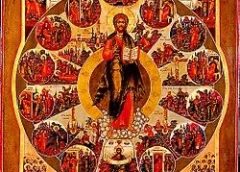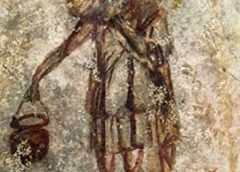Love is, besides a feeling, an energy that cannot be limited: it is the principle of universal existence… From love we were born. According to love we were made. Towards love we expand. To love we give ourselves (1). Love unifies. It cannot be reduced to principles, doctrines, dogmas, names or forms. Creation is sustained by this energy that constitutes us in Unity: My ´innermost nature´ is His own, certainly without fault or defect. Between the two of us there is no time and in my soul the occult world manifests itself. After having known my soul without mixtures or disorders, I have reached the object of my love, without long or short distances… nor do I have a temporal duration that could destroy me (2). In a world which destroys itself in confusion, selfishness and fear, our power is love.

Creation is interlaced with multiple dimensions or worlds; the power of love opens the door to unified conscience, which detects hidden unity in diversity of appearances. People who activate the power to love observe landscapes that seem unreal to those blinded by the lights and shadows of the kingdom of things. A great number of women and men of all times and religions that accessed the unifying vision of love were and are victims of their religions´ hierarchies.
Mystics do not require the sieve of religions to relate with Unity. Direct contact of the soul with its origin, without intermediaries, is similar in mystics bonded to Zoroastrianism, Judaism, Christianity, Islam, Hinduism, Buddhism, Taoism and Shamanisms. Mystics, independent of the spiritual tradition from which they proceed have in common, besides the vision that transcends the world of things, the intense feeling of love and the ardent form in which they express it: dazzling flashes of poetry, singing and dance, torches which illuminate the dark night of humankind. Some mystics bind up in love with the Creator, such as Sufis and Cabbalists, others with the messenger considered avatar, as is the case of Christians, Hindus and Buddhists.
To love means to mobilize these forces which escape reason but are discernible by the heart. False ego centered in itself and in ´mine´ limits and fragments itself, taking the part as if it were the whole. Domination strategies promote this need of the false ego to feel unique and special. Love brakes barriers, erases boundaries, and allows the vision of unity beyond apparent differences. The dominating system reinforces fragmented vision, the tribal mentality that prevails in humankind. This false interpretation of reality originates exclusive thoughts and emotions, with the objective to promote fragmented consciousness in self-centered individuals. Social networks create a mirage of unity, but what they really do is to support domination, competition and personal importance.

It is love that speaks to you, calling you beyond this created kingdom! (3) The voice of love, of Unity is initially silenced by rational thinking. If the person perseveres and listens to the voice of love, she starts on the road of infinite depth that implies progressive change of individual identity centered in false ego –family, pertaining group, nation– to an identity bonded to Unity. Starting from this understanding of Unity a new mind is forged, the awakened mind of the mystic: If we say: I am One, its being is too! If my being affirms itself, duality results! (4).
Remembering you I have lost myself so much, that that whom I find in my way I ask about me (5). Remembrance of the Eternal is the pivot on which Shams-i-Tabrīzī and Rumi revolved, and dervishes that unify heaven and earth with extended arms and ecstatic gaze continue to turn round. It is the force of the devoted that wake up at dawn embraced internally and externally by the First and the Last. Husayn Mansur Al-Hallaj, the martyr in the Beloved´s permanent remembrance said: In that glory there is no I, or us, or you. I, we, you and He are all one and the same thing (6). The martyr said the well-known phrase for which he was accused of usurping the supreme power of God: Ana Al Haqq, I am Truth. Al Haqq is one o the ninety-nine names of Allah. This phrase repeated by Mansur until his crucifixion and death means I am Unity.
The certainties of unity of unified conscience are usually rejected by established dualistic religions. Christian based religions accept this unity, but limit it to Jesus. From this doctrinal perspective the declaration My Father and I are One (7) would relate exclusively to Jesus. Notwithstanding this, statements like the one mentioned before and like My Father is in me and I am in my Father (8) are common among mystics and an incontrovertible reality for people conscious of Unity. I am no longer what I was, because saying I and God is to deny Divine Unity (9).
Jesus centers his teachings in three commandments of love, which are synthesized in a unique one: to love Unity. These commandments reflect the intrinsic relationship God/fellow-being/I: The greatest of all commandments is: listen, oh Israel: Yahweh our God, Yahweh is one, and you shall love Yahweh your God, with all your heart, with all your soul, with all your mind and with all your strength. And the second is similar to this: you will love your neighbor as you love yourself. There are no greater commandments than these (10). Jesus retook these commandments from Deuteronomy 6:4-5 and from Leviticus 19:18, respectively. These are eternal teachings that no one should obviate.
Rabe´ah Adawiyya Al Qaysiyya, the Persian orphan girl of the VIII century sold as slave for an insignificant price, notwithstanding her material want or thanks to it, felt one in the One: Oh my God! My only occupation, my only desire in this word among all things created, is the remembrance of You (11). During her pilgrimage to Mecca, Rabe´ah cried: My heart is full of sadness. Where do I betake myself? I am just a handful of dust and your house is only a stone. You are my only wish (12).
They asked Rabe´ah: Where do you come from? From another world, she answered. Where are you going? To another world, she responded. In this world, what do you do? They asked. I mock it, she said… I consume the bread of this world, she explained, while I occupy myself in the matters of the beyond. In one occasion they asked Rabe´ah: Do you love God? Yes, she affirmed. Are you Satan´s enemy? They insisted. Rabe´ahconfessed: my love of the compassionate does not leave any hostility toward Satan in me (13). She also said: To me, You suffice to me (14). Eight centuries later Santa Teresa de Avila wrote: Whoever has God lacks nothing. God alone is enough (15).
Farid Al Din Attar in The language of the Birds, wrote: If you do not feel the same love as Rabe´ah, how are you going to understand the value of this story? While you go round and round in this sea of vanities, waves rise because of your rejections and your acceptances. Sometimes they allow you to enter the Ka´aba, some other times they lead you to a convent, but if you show your head outside the whirlwind , you will be able to center, more and more, with each breath, in the Beloved (16).

Powerful king David wrote: I patiently waited in Yahweh; He turned to me and paid attention to my entreaty. He took me out of the well of depression, of the mire of desolation; on a rock He put my feet and steadied my steps. He put a new song in my mouth (17) His son Solomon wrote in the Song of Songs: I entreat you oh daughters of Jerusalem, if you find my beloved, tell him I am ill with love (18) I beseech… you do not incite or rouse love until he wishes (19). Many waters will not be able to extinguish love, or rivers will be able to flood it (20).
The objective of spiritual love is the reunification or identification which implies that the essence of the beloved becomes the true essence of the lover and the essence of the lover the true essence of the beloved (21). As a consequence of this identification, St John of the Cross wrote: In a dark night, with longings, in love inflamed, oh happy fortune, I went out without being noticed while my house was calm (…) oh night that you led! Oh night in which you joined Beloved with beloved, beloved in the Beloved transformed! (22). As the poem´s epigraph, wrote St. John of the Cross: Songs of the soul that pleasures itself at having reached the high state of perfection which is the union with God by route of spiritual denial. The Qu’ran speaks of such tranquil soul: Oh soul at rest, go back to your Lord, you that are well pleased with Him, you with whom He is” well pleased. “Thus enter among my servants, and enter my garden! (23).
For Teresa of Avila the thing is not to think much, but to love much (24). The Saint explains in the Seventh Dwelling This secret union takes place in the very inner center of the soul, which must be where God himself is, and to my mind He does not need door to enter… It is so great a secret and so elevated a favor what God there communicates in an instant to the soul, and such great delight the soul feels, that I do not know what it should be compared to… The soul, I mean the spirit of this soul, becomes one thing with God (25) …In this temple of God, in this dwelling of His, only He and the soul enjoy themselves with great silence (26). In the poem Love Colloquium she confesses that What I fear the most is to lose You (27). Teresa, the courageous woman to whom ecclesiastical hierarchies of the Holy Office of the Inquisition were not able to intimidate enough to make her renounce to love, to think and to write, notwithstanding the many stakes that were raised at her steps, wrote in her poem: Oh Beauty That You Exceed!: You join he who has no being with the Being with no end; without ending, you end, without having to love, You love, You make great our nothingness (28).

To love is a spiritual experience that liberates. This is love: to fly to a secret heaven, to each instant tear a hundred veils. At the start, to renounce life; at the end, to walk without feet. To consider this world as if it were invisible and pay no heed to what turns up to the being (29). To love is also an act of free reciprocity: Love Me for me to love You. If you do not love Me, My love will never be able to reach you (30).
The opposite feeling of love is hate. Hate –anger, desire to dominate- disintegrates; it produces unbalance which leads to physical and mental illnesses. Subjacent to hate is fear, which is a consequence of absence of love: In love there is no fear, instead perfect love throws out fear because fear originates in mistrust; one who fears has not been perfected through love (31). Fear is caused by the false idea of being a separate entity, forsaken, in danger. Love —charity, respect for all forms of existence— integrates. Love creates and keeps organic and social equilibriums. Buddha expressed: In this world, hate never ceases by hating; it only ceases through love. This is an eternal law (32). In this manner Jesus expressed the eternal law about the power of love over hate: You have heard it said: love your fellow man and hate your enemy, but I tell you: love your adversaries, bless those who curse you, do good to those who abhor you and pray for those who take you by force and persecute you (33).
Love of the eternal translates in daily life into love for your neighbor. If the spiritual experience of love of the eternal does not translate into love for your fellow-being, it could probably be a religious experience destined to obtain personal security, instead ofa spiritual experience of love. The main teaching of Jesus consisted in loving: God is love, and everyone who remains in love remains in God (34). But if anyone says ´I love God´ but hates his brother, that one is a liar; because anyone who does not love his brother whom he has seen, how can he love God whom he has not seen? And this is the commandment that we have received from Him: All those who love God, let them love their brother (35).
The spiritual experience of love is not limited by the name with which the Beloved is invoked, or by the devotional ritual employed: There was a time in which I rejected my fellow-being if his faith was not my own. Now my heart is capable to adopt all forms: it is a meadow for the deer and a cloister for the Christian monk, temple for the idols and Ka´aba for the pilgrims, it is recipient or the tables of the Torah and verses of the Quran. Because my faith is love, it is the same wherever the caravan of love goes,its road is the path of my faith (36). You must know that Judaism, Christianity, and Islam, as well as other religions, are designations and names: the objective each one points at is always the same and is invariable (37).
Each mystic has his own way of binding himself to the Beloved: one day a voice will cry out: there is no route or path (38). Where do you look for me? Can you not see I am beside you? I am not in the temple or in the mosque… I am not in the rites or in the ceremonies… If you truly search you will see me immediately; in an instant you will find me. God is the breath of all breaths (39).
Most religions have converted the teachings of love in doctrines and rituals hiding the essence of their common message, which is to awaken conscience of the Creator – Creation unit. We need spiritual experiences which transform consciences to put an end to atrocities produced by enslaving dogmatic religions. Unity and unified conscience are synonyms of love. Religious doctrines about Jesus divide Jews, Muslims and Christians. They also divide millions of Christians among themselves. Nonetheless the message of Jesus by Jesus does not generate controversies because it is not doctrinal, thus, it does not exclude: it is a message that includes and assembles daily life with indivisible unity.
I went from God to God until they cried out from me, inside me, Oh, You-I! (40).
(1)Ibn Arabi Tratado del Amor EDAF Arca de Sabiduría, Madrid 1996; p 36
(2)Ibn Arabi Tratado de la Unidad Editorial Sirio S.A., Málaga 2002, pp 83-84
(3)Khâqâni Shirwanî, cit Dr Javad Nurbakhsh En el Paraíso de los Sufíes, Luis Cárcamo editor, Madrid 1992
(4)Ibn Arabi Tratado del Amor op cit; p 32(5)Khâqâni Shirwanî op cit.(6)Ibn Arabi Tratado de la Unidad op cit; p 19.
(7) Relato del Evangelio según Juan 10,30 Biblia Peshitta en Español Traducción de los Antiguos Manuscritos Arameos, Tennessee 2006
(8) Relato del Evangelio según Juan 10,38 Biblia Peshitta
(9) Ibn Arabi op cit p 55.
Acerca de la autora

- Es autora de libros y artículos; cofundadora del primer centro de estudios de la mujer en México. Es Psicóloga Clínica con estudios de maestría y doctorado realizados en Francia y Brasil. Fue profesora universitaria en diversas instituciones académicas de la Ciudad de México y de Veracruz, así como cofundadora de las Agencias Especializadas en Delitos Sexuales.
Últimas entradas
 Psicología28 agosto, 2021EL MENSAJE DE UNIDAD – Jesús y la mujer de Siquén
Psicología28 agosto, 2021EL MENSAJE DE UNIDAD – Jesús y la mujer de Siquén Psicología25 julio, 2021LAS VIDAS PASADAS – Psicoterapia de regresión a otras vidas
Psicología25 julio, 2021LAS VIDAS PASADAS – Psicoterapia de regresión a otras vidas Conciencia unificada11 abril, 2021HIJO DE HOMBRE – Las enseñanzas de Jesús de Nazareth
Conciencia unificada11 abril, 2021HIJO DE HOMBRE – Las enseñanzas de Jesús de Nazareth Espiritualidad6 marzo, 2021Y DESPUÉS DE MORIR, ¿QUÉ PASARÁ? —Entre el espíritu y la materia
Espiritualidad6 marzo, 2021Y DESPUÉS DE MORIR, ¿QUÉ PASARÁ? —Entre el espíritu y la materia




